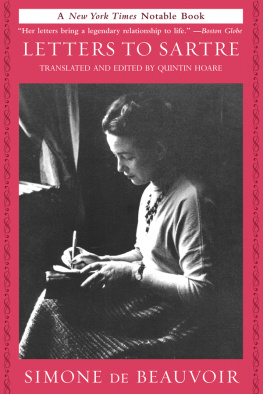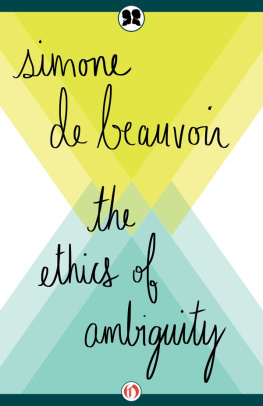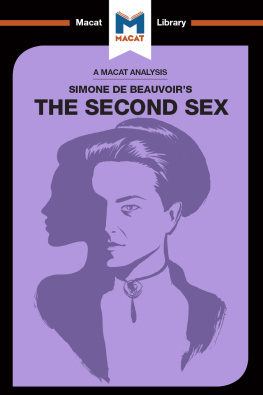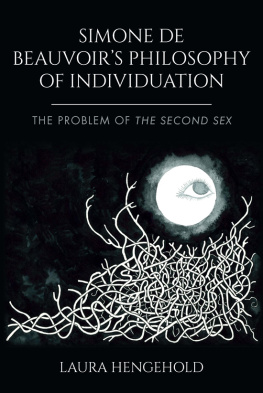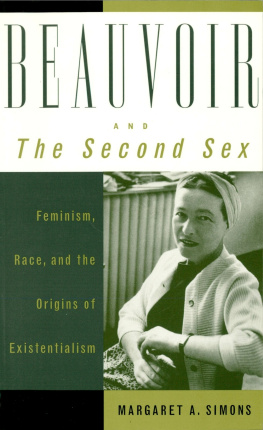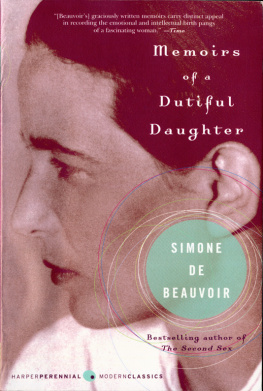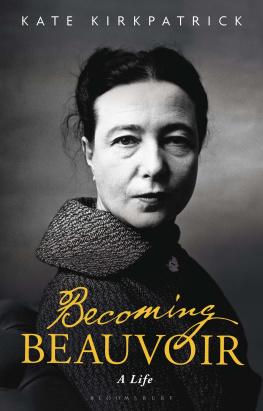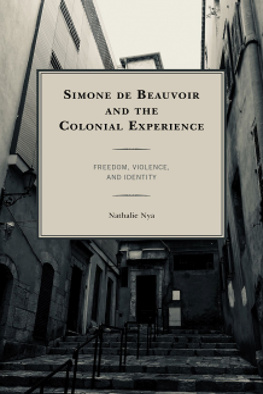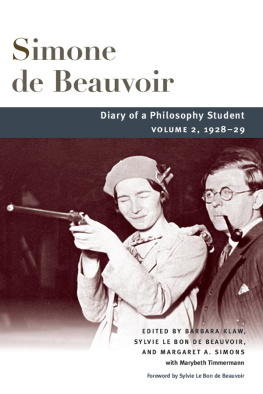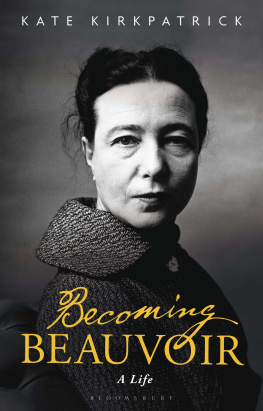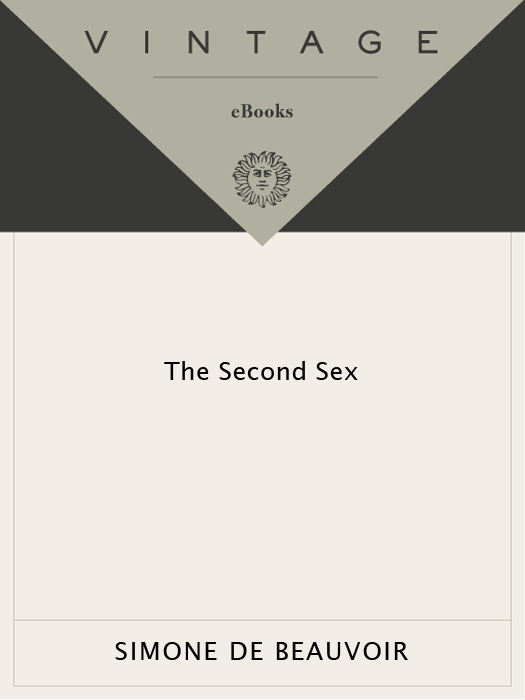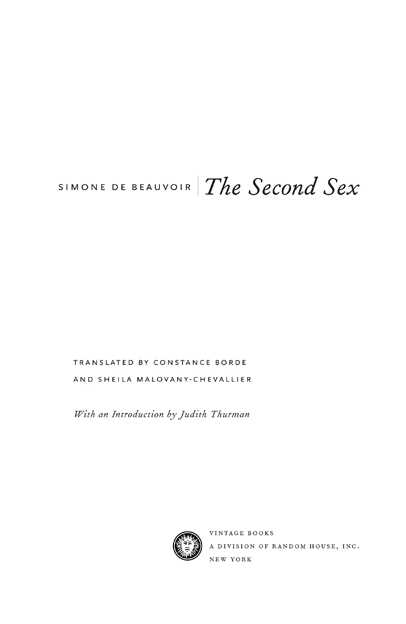SIMONE DE BEAUVOIR
The Second Sex
Simone de Beauvoir was born in Paris in 1908. In 1929 she became the youngest person ever to obtain the agrgation in philosophy at the Sorbonne, placing second to Jean-Paul Sartre. She taught in lyces in Marseille and Rouen from 1931 to 1937, and in Paris from 1938 to 1943. After the war, she emerged as one of the leaders of the existentialist movement, working with Sartre on Les Temps Modernes. The author of many books, including the novel The Mandarins (1957), which was awarded the Prix Goncourt, Beauvoir was one of the most influential thinkers of her generation. She died in 1986.
Constance Borde and Sheila Malovany-Chevallier have lived in Paris for more than forty years and are both graduates of Rutgers University, New Jersey. Borde and Malovany-Chevallier were faculty members at the Institut dtudes Politiques. They have been translating books and articles on social science, art, and feminist literature for many years and have jointly authored numerous books in English and in French on subjects ranging from grammar to politics to American cooking.
FIRST VINTAGE BOOKS EDITION, MAY 2011
Le deuxime sexe copyright 1949 by ditions Gallimard, Paris
Translation copyright 2009 by Constance Borde and Sheila Malovany-Chevallier
Introduction copyright 2010 by Judith Thurman
All rights reserved. Published in the United States by Vintage Books, a division of Random House, Inc., New York, and in Canada by Random House of Canada Limited, Toronto. Originally published in France in two volumes as Le deuxime sexe: Les faits et les mythes (Vol. 1) and Lexprience vcue (Vol. 11) by ditions Gallimard, Paris. Copyright 1949 by ditions Gallimard, Paris. This translation originally published in hardcover in slightly different form in Great Britain by Jonathan Cape, The Random House Group Ltd., London, in 2009, and subsequently published in hardcover in the United States by Alfred A. Knopf, a division of Random House, Inc., New York, in 2010.
Vintage and colophon are registered trademarks of Random House, Inc.
The Library of Congress has cataloged the Knopf edition as follows:
Beauvoir, Simone de, 19081986.
[Deuxime sexe. English]
The second sex / Simone de Beauvoir ; translated by Constance Borde and
Sheila Malovany Chevallier.
p. cm.
1. Women. I. Borde, Constance. II. Malovany-Chevallier, Sheila. III. Title.
HQ1208.B352 2010
305.401dc22
2009023164
eISBN: 978-0-307-81453-1
www.vintagebooks.com
v3.1
To Jacques Bost
There is a good principle that created
order, light, and man
and a bad principle that created
chaos, darkness, and woman.
PYTHAGORAS
Everything that has been written by men
about women should be viewed with suspicion,
because they are both judge and party.
POULAIN DE LA BARRE
Contents
Introduction
In 1946, Simone de Beauvoir began to outline what she thought would be an autobiographical essay explaining why, when she had tried to define herself, the first sentence that came to mind was I am a woman. That October, my maiden aunt, Beauvoirs contemporary, came to visit me in the hospital nursery. I was a day old, and she found a little tag on my bassinet that announced, Its a Girl! In the next bassinet was another newborn (a lot punier, she recalled), whose little tag announced, Im a Boy! There we lay, innocent of a distinctionbetween a female object and a male subjectthat would shape our destinies. It would also shape Beauvoirs great treatise on the subject.
Beauvoir was then a thirty-eight-year-old public intellectual who had been enfranchised for only a year. Legal birth control would be denied to French women until 1967, and legal abortion, until 1975. Not until the late 1960s was there an elected female head of state anywhere in the world. Girls of my generation searching for examples of exceptional women outside the ranks of queens and courtesans, and of a few artists and saints, found precious few. (The queens, as Beauvoir remarks, were neither male nor female: they were sovereigns.) Opportunities for women have proliferated so broadly in the past six decades, at least in the Western world, that the distance between 2010 and 1949, when The Second Sex was published in France, seems like an eternity (until, that is, one opens a newspaperthe victims of misogyny and sexual abuse are still with us, everywhere). While no one individual or her work is responsible for that seismic shift in laws and attitudes, the millions of young women who now confidently assume that their entitlement to work, pleasure, and autonomy is equal to that of their brothers owe a measure of their freedom to Beauvoir. The Second Sex was an act of Promethean audacitya theft of Olympian firefrom which there was no turning back. It is not the last word on the problem of woman, which, Beauvoir wrote, has always been a problem of men, but it marks the place in history where an enlightenment begins.

Simone-Ernestine-Lucie-Marie Bertrand de Beauvoir was born in 1908 into a reactionary Catholic family with pretensions to nobility. She had a Proustian childhood on the Boulevard Saint-Germain, in Paris. But after World War I, her father, Georges, lost most of his fortune, and without dowries Simone and her sister, Hlne, had dim prospects for a marriage within their class. Their mother, Franoise, a bankers daughter who had never lived without servants, did all the housework and sewing for the family. Her pious martyrdom indelibly impressed Simone, who would improve upon Virginia Woolfs famous advice and move to a room of her ownin a hotel, with maid service. Like Woolf, and a striking number of other great women writers, Beauvoir was childless. And like Colette, who wasnt (she relegated her late-born, only daughter to the care of surrogates), she regarded motherhood as a threat to her integrity. Colette is a ubiquitous presence in The Second Sex, which gives a new perspective to her boast, in a memoir of 1946, that my strain of virility saved me from the danger which threatens the writer, elevated to a happy and tender parent, of becoming a mediocre author Beneath the still young woman that I was, an old boy of forty saw to the well-being of a possibly precious part of myself.
Mme de Beauvoir, intent on keeping up a facade of gentility, however shabby, sent her daughters to an elite convent school where Simone, for a while, ardently desired to become a nun, one of the few respectable vocations open to an ambitious girl. When she lost her faith as a teenager, her dreams of a transcendent union (dreams that proved remarkably tenacious) shifted from Christ to an enchanting classmate named ZaZa and to a rich, indolent first cousin and childhood playmate, Jacques, who took her slumming and gave her a taste for alcohol and for louche nightlife that she never outgrew. (Not many bookish virgins with a particle in their surname got drunk with the hookers and drug addicts at Le Styx.) Her mother hoped vainly that the worthless Jacques would propose. Her father, a ladies man, knew better: he told his temperamental, ill-dressed, pimply genius of a daughter that she would never marry. But by then Simone de Beauvoir had seen what a woman of almost any qualityhighborn or low, pure or impure, contented with her lot or alienatedcould expect from a mans world.



